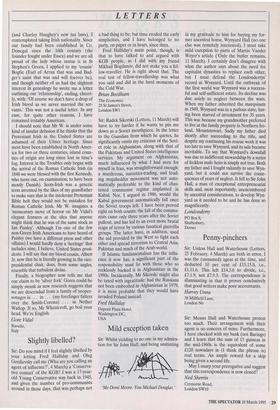Sir: Radek Sikorski (Letters, 11 March) will have to try
harder if he wants to pin me down as a Soviet mouthpiece. In the letter to the Guardian from which he quotes, he significantly omits my criticism of the Sovi- et role in Afghanistan, along with that of the Pakistani and United States intelligence services. My argument on Afghanistan, much influenced by what I had seen for myself in Iran, was straightforward enough: a murderous, narcotics-trading, and feud- ing mujaheddin movement was not auto- matically preferable to the kind of chas- tened communist regime implanted in Kabul. Nor, I argued in 1986, would the Kabul government automatically fall once the Soviet troops left. I have been proved right on both counts: the fall of the commu- nists came only three years after the Soviet pullout, and has led to an even more brutal reign of terror by various fanatical guerrilla groups. The latter have, in addition, used the aid provided by the West to fight each other and spread terrorism to Central Asia, Pakistan and much of the Arab world.
If Islamic fundamentalism has the influ- ence it now has, a significant part of the responsibility must lie with those who so recklessly backed it in Afghanistan in the 1980s. Incidentally, Mr Sikorski might also be taxed with ingratitude: had the Russians not been embroiled in Afghanistan in 1979, it is most probable that they would have invaded Poland instead.
Fred Halliday
Dupont Plaza Hotel, Washington DC, USA


























































 Previous page
Previous page